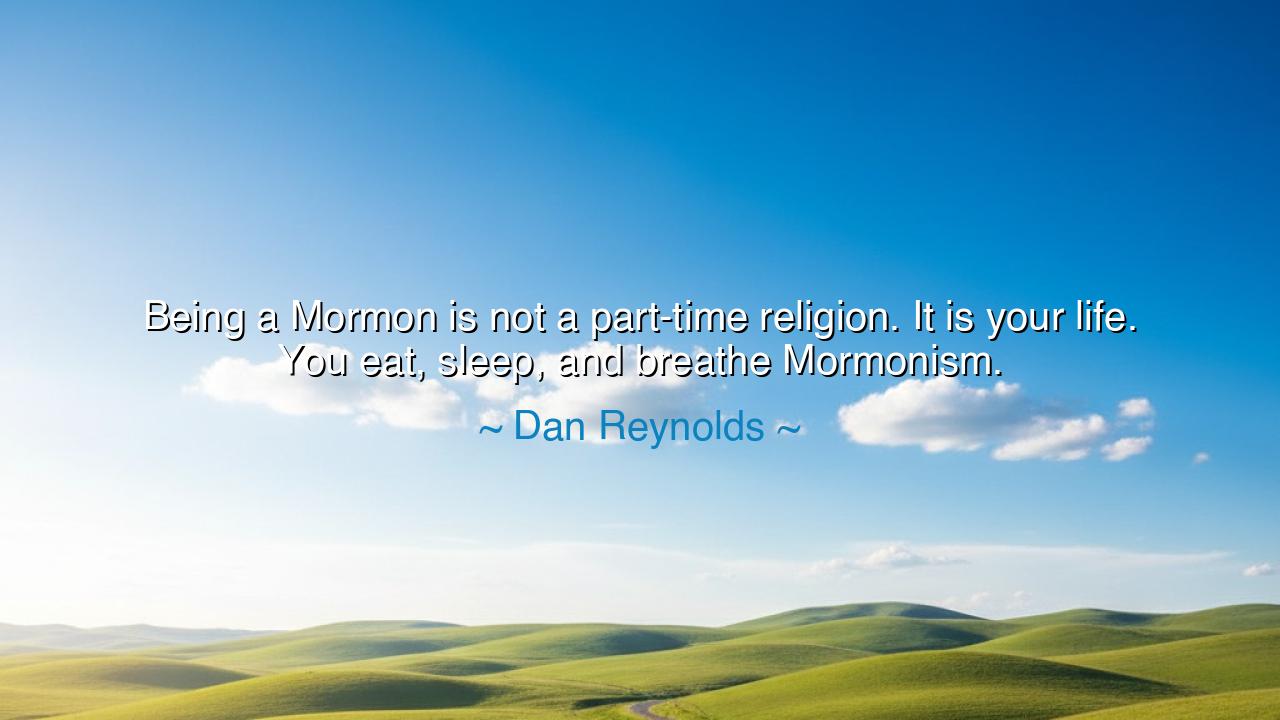
Being a Mormon is not a part-time religion. It is your life. You
Being a Mormon is not a part-time religion. It is your life. You eat, sleep, and breathe Mormonism.






The words of Dan Reynolds—“Being a Mormon is not a part-time religion. It is your life. You eat, sleep, and breathe Mormonism.”—speak with the weight of total devotion. They remind us that true faith, once embraced, does not linger on the edges of existence like a cloak to be worn and removed at will. Instead, it penetrates the marrow of one’s being, shaping thought, action, and identity. In this confession, Reynolds unveils the all-encompassing power of belief: that religion is not merely a Sunday ritual or a distant inheritance, but a way of life that demands the whole heart.
The origin of this statement lies in Reynolds’ own journey as a member of The Church of Jesus Christ of Latter-day Saints. Raised in a community where faith was not a passing interest but a living, breathing culture, he knew firsthand that Mormonism touches every corner of life. Its teachings guide the family, the home, the diet, the speech, the labor, the recreation, even the dreams. For him, and for many others, Mormonism was not simply something to believe in—it was something to embody. Thus his words ring with both recognition and reverence, acknowledging that such devotion is a defining mark of religious life.
Throughout history, we see echoes of this same truth: that the deepest faiths are not partial, but total. The monks of medieval Christendom abandoned wealth and kin to live cloistered lives of prayer, eating and breathing the rhythm of the Psalms. The samurai of Japan infused their very code of battle with the spirit of Zen, merging discipline with transcendence until the line between sword and prayer blurred. The Hebrew prophets, too, lived under the fire of their call, where even their dreams were claimed by the voice of God. Reynolds’ statement is but a modern witness of this ancient reality: faith, if true, is not occasional, but continual.
To eat, sleep, and breathe one’s faith is also to recognize its power to create community and identity. When a people share not only worship but a whole way of living—customs, speech, habits, and ideals—they become a tribe, bound by invisible threads stronger than law or blood. This has ever been the strength of faith: it forges not just belief, but belonging. To walk in such unity is to know that every action, from the smallest to the greatest, participates in a sacred whole.
Yet Reynolds’ words may also be heard as a challenge. For such total devotion can feel both inspiring and heavy. If faith claims the whole of life, then it is not easily laid aside when inconvenient. It demands consistency, courage, and sacrifice. Consider the story of the early Mormon pioneers, who crossed barren plains and snow-covered mountains to find a land where they could practice freely. Their journey was not part-time; it was life itself, with every breath spent in devotion to their cause. Their endurance is the living embodiment of Reynolds’ statement: faith that consumes the whole being can withstand the harshest trials.
The lesson here is timeless: whatever you give your life to, give it wholly. If faith is your path, then let it be the air you breathe, the bread you eat, the song you dream in the night. Do not live half-heartedly, for divided devotion is fragile and soon breaks. Whether your path is religion, justice, art, or love, let it become your life in its fullness, that you may stand unshaken when storms come.
Practically, this means aligning your daily actions with your deepest convictions. If you believe in compassion, let it color every word you speak. If you believe in truth, let it govern every choice you make. If you believe in God, let His presence saturate not only your prayers but your labor, your family, your rest. To eat, sleep, and breathe your values is to embody them so fully that they cannot be separated from who you are.
Thus, Dan Reynolds’ words echo with the wisdom of the ancients: faith is not part-time. It is a fire that must consume, a river that must flow through every channel of existence. To live otherwise is to live divided, but to give yourself wholly is to live with power, unity, and purpose. And in this total devotion lies not only strength, but the possibility of leaving behind a legacy that endures beyond the span of one life.






AAdministratorAdministrator
Welcome, honored guests. Please leave a comment, we will respond soon